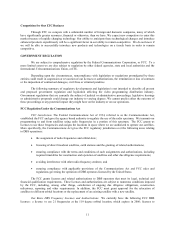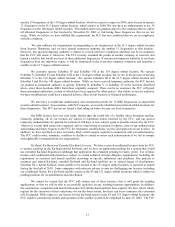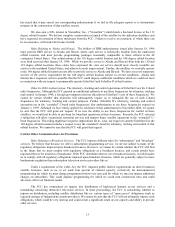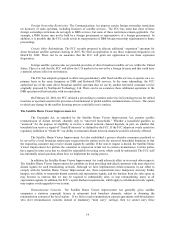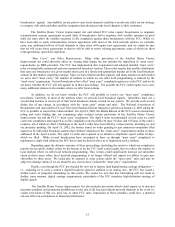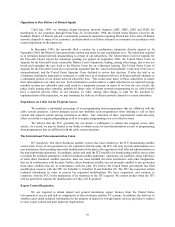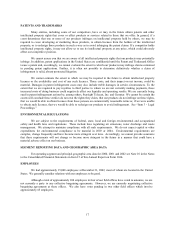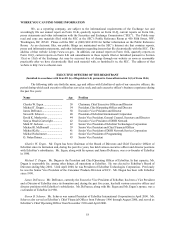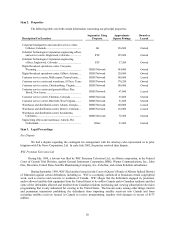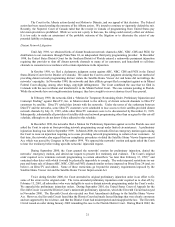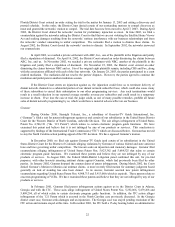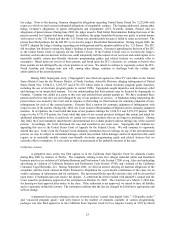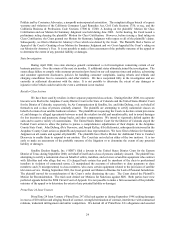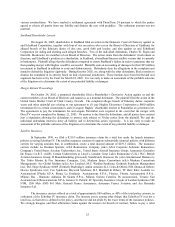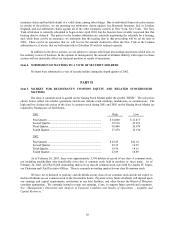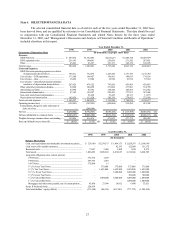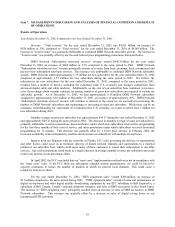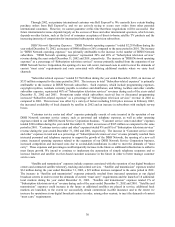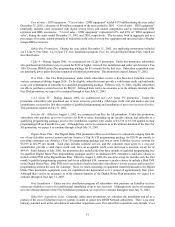Dish Network 2002 Annual Report Download - page 23
Download and view the complete annual report
Please find page 23 of the 2002 Dish Network annual report below. You can navigate through the pages in the report by either clicking on the pages listed below, or by using the keyword search tool below to find specific information within the annual report.21
The Court in the Alberta action denied our Motion to Dismiss, and our appeal of that decision. The Federal
action has been stayed pending the outcome of the Alberta action. We intend to continue to vigorously defend the suit.
Recently, the Supreme Court of Canada ruled that the receipt in Canada of programming from United States pay
television providers is prohibited. While we were not a party to that case, the ruling could aversely affect our defense.
It is too early to make an assessment of the probable outcome of the litigation or to determine the extent of any
potential liability or damages.
Distant Network Litigation
Until July 1998, we obtained feeds of distant broadcast network channels (ABC, NBC, CBS and FOX) for
distribution to our customers through PrimeTime 24, an independent third party programming provider. In December
1998, the United States District Court for the Southern District of Florida entered a nationwide permanent injunction
requiring that provider to shut off distant network channels to many of its customers, and henceforth to sell those
channels to consumers in accordance with certain stipulations in the injunction.
In October 1998, we filed a declaratory judgment action against ABC, NBC, CBS and FOX in the United
States District Court for the District of Colorado. We asked the Court to enter judgment declaring that our method of
providing distant network programming did not violate the Satellite Home Viewer Act and hence did not infringe the
networks’ copyrights. In November 1998, the networks and their affiliate groups filed a complaint against us in Miami
Federal Court alleging, among other things, copyright infringement. The Court combined the case that we filed in
Colorado with the case in Miami and transferred it to the Miami Federal Court. The case remains pending in Florida.
While the networks have not sought monetary damages, they have sought to recover attorney fees if they prevail.
In February 1999, the networks filed a “Motion for Temporary Restraining Order, Preliminary Injunction and
Contempt Finding” against DirecTV, Inc. in Miami related to the delivery of distant network channels to DirecTV
customers by satellite. DirecTV settled that lawsuit with the networks. Under the terms of the settlement between
DirecTV and the networks, some DirecTV customers were scheduled to lose access to their satellite-provided distant
network channels by July 31, 1999, while other DirecTV customers were to be disconnected by December 31, 1999.
Subsequently, substantially all providers of satellite-delivered network programming other than us agreed to this cut-off
schedule, although we do not know if they adhered to this schedule.
In December 1998, the networks filed a Motion for Preliminary Injunction against us in the Florida case and
asked the Court to enjoin us from providing network programming except under limited circumstances. A preliminary
injunction hearing was held in September 1999. In March 2000, the networks filed an emergency motion again asking
the Court to issue an injunction requiring us to cease providing network programming to certain of our customers. At
that time, the networks also argued that our compliance procedures violated the Satellite Home Viewer Improvement
Act, which was passed by Congress in November 1999. We opposed the networks’ motion and again asked the Court
to hear live testimony before ruling upon the networks’ injunction request.
During September 2000, the Court granted the networks’ motion for preliminary injunction, denied the
networks’ emergency motion, and denied our request to present live testimony and evidence. The Court’s original
order required us to terminate network programming to certain subscribers “no later than February 15, 1999,” and
contained other dates with which it would be physically impossible to comply. The order imposed restrictions on our
past and future sale of distant ABC, NBC, CBS and FOX channels similar to those imposed on PrimeTime 24 (and, we
believe, on DirecTV and others). Some of those restrictions go beyond the statutory requirements imposed by the
Satellite Home Viewer Act and the Satellite Home Viewer Improvement Act.
Twice during October 2000, the Court amended its original preliminary injunction order in an effort to fix
some of the errors in the original order. The twice-amended preliminary injunction order required us to shut off, by
February 15, 2001, all subscribers who were ineligible to receive distant network programming under the Court’s order.
We appealed the preliminary injunction orders. During September 2001, the United States Court of Appeals for the
Eleventh Circuit vacated the District Court’s nationwide preliminary injunction, which the Eleventh Circuit had stayed
in November 2000. The Eleventh Circuit also rejected our First Amendment challenge to the Satellite Home Viewer
Act. However, the Eleventh Circuit found that the District Court had made factual findings that were clearly erroneous
and not supported by the evidence, and that the District Court had misinterpreted and misapplied the law. The Eleventh
Circuit issued an order during January 2002 remanding the case to the Florida District Court. During March 2002, the


